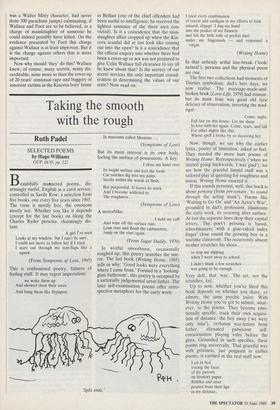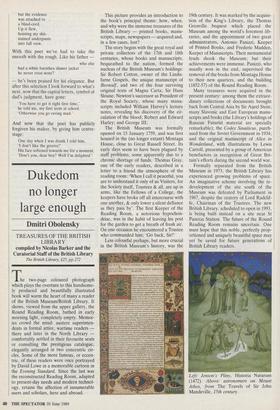Taking the smooth with the rough
Ruth Padel
SELECTED POEMS by Hugo Williams OUP, £6.95, pp. 122 Beautifully mannered poems, dis- armingly rueful, English as a carol service, controlled as Savile Row: a selection from five books, one every five years since 1965. The verse is mostly free, the emotions mostly not. Whether you like it depends (except for the last book) on liking the Charles Ryder persona, charmingly dis- tant: A girl I've seen Looks at my window, but I can't be sure.
I could not move to follow her if I tried.
I stare out through my tent-flaps like a squaw.
(From Symptoms of Loss, 1965) This is confessional poetry, failures of feeling stuff. It may regret imperialism: we woke them up
And showed them their sores And hung them like flypapers In museums called Missions.. .
(Symptoms of Loss) But its main interest is its own body, feeling the surface of possessions. A key:
I close my hand over Its bright surface and feel the fresh- Cut notches dig into my palm, Sterile within the wards of flesh, But purposeful. It leaves its mark And I become addicted to The roughness.. .
(Symptoms of Loss) A motorbike:
I hold my cuff And wipe off the surface rain, Lean over and flood the carburettor, Jump on the start again.
(From Sugar Daddy, 1970) In wistful smoothness, occasionally roughed up, this poetry searches the mir- ror. The last book (Writing Home, 1985) tells us why: 'Good looks were everything where I came from.' Formed in a 'looking- glass bathroom', this poetry is occupied by a sartorially judgemental actor-father. The later self-examination poems offer retro- spective metaphors for the early work:
`Split ends.' I tried every combination of cravat and cardigan in my efforts to look
natural, degage. I dug my hand
into the pocket of my flannels and felt the little rolls of pocket dust under my fingernails — and remained a virgin.
(Writing Home) In that artlessly artful line-break (look/ natural'), persona and the physical poem are one.
The first two collections had moments of Thirties symbolism: dad's best days, we now realise. The marriage-made-and- broken book (Love-Life, 1979) had tristesse, but its main tone was good old lyric delicacy of observation, inverting the mad- rigal:
Come, night, Fall fast on this house. Let me sleep In love with her again. Come, tears, and fall For other nights like this, Whose spell I broke by so deceiving her.
Now, though, we see why the earlier lyrics, poetry of limitation, asked to feel. They needed the more hurt poems of Writing Home. Retrospectively ('when we started going backwards, I was glad'), we see how the graceful limpid stuff was a tailored play at questing for roughness and lesion. Writing Home enacted it.
If this sounds personal, well, this book is about persona (from per-sonare, `to sound through the acting mask'). Poems like `Waiting to Go On' and 'An Actor's War', grounded in dad's profession, illuminate the early work, its yearning after surface. At last the separate lines drop their capital letters. The poet's persona is bared, schoolmasters 'with a glue-caked index finger' close round the growing boy in a wartime classroom. The recurrently absent mother scratches his shoes,
to stop me slipping when I went away to school.
I didn't think a few scratches . . . was going to be enough. . . .
Very deft, that 'was'. The act, not the scratches, fail.
Up to now, whether you've liked this book depends on whether you share, or admire, the same psychic tailor. With Writing Home you've got to submit, what- ever, to the poems. They become emo- tionally specific, track their own acquisi- tion of distance: the boy away (`we were only nine'), verbatim war-letters from father, alienated pubescent self- consciousness playing roles before the glass. Grounded in such specifics, these poems ring universally. That graceful way with grittiness, just poignant in earlier poems, is earthed in the real stuff now: I sat in bed
tracing the faces of my parents on lavatory paper.
Riddles and smut poured from their lips in my defence, but the evidence was attached to , a blind-cord.
Up it flew, hoisting my shit- stained underpants into full view.
With this poet we've had to take the smooth with the rough. Like his father -
who else had a white barathea dinner jacket he never even wore?
— he's been praised for hig elegance. But after this selection I look forward to what's next, now that the capital letters, symbol of dad's judgment, have gone:
'You have to get it right first time,' he told me, my first term at school. 'Otherwise you go raving mad.'
And now that the poet has publicly forgiven his maker, by giving him centre- stage: One day when I was drunk I told him, 'I don't like the groove!'
His face softened towards me for a moment. 'Don't you, dear boy? Well I'm delighted.'



























































 Previous page
Previous page